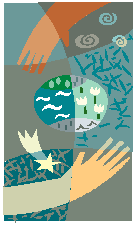


This polarization is fueled by self-righteousness – “My viewpoint is the only way. My side is RIGHT!”
Where do these judgments come from? Our psyches are not unitary but, instead, are made up of many selves. Our judgments come from the primary selves that govern our lives – selves that determine how we think, feel and behave without our awareness – selves that feel like who we really are.
 Our
Inner “Cast of Characters” Colors How We See the World
Our
Inner “Cast of Characters” Colors How We See the World
These primary selves help us succeed in the world in certain ways.
But selves that function without our awareness also make us vulnerable.
 |
|
 Learn to Use Judgements Creatively to
Turn Debate into Dialogue
Learn to Use Judgements Creatively to
Turn Debate into Dialogue
How can we resolve such deep-seated conflicts that have been with us for eons? The technique of Voice Dialogue offers a unique approach to bridging the judgment gap and creating genuine “détente.”
Through Voice Dialogue, we can actually talk to the Pusher, the Achiever and all the parts of our primary selves. We move beyond being totally identified with these selves. Using the very judgments that have defined and limited us:
 Your Inner
Selves Become Your Teachers for Transcending Polarities
Your Inner
Selves Become Your Teachers for Transcending Polarities
 Begin Your Inner Journey Today
Begin Your Inner Journey TodayAuthor of Who’s
Practicing Your Practice?
www.voicedialoguetrainings.com – 512-444-7733 –
Mdcartw@aol.com
copyright
2005 M. Dorsey
Cartwright –
Thanks to Drs. Hal and Sidra Stone, www.voicedialogue.org.
About
Voice Dialogue
Voice
Dialogue is
a method for entering into direct communication with a
person’s inner community or inner family. The
Psychology of Selves is Dr. Hal and Sidra
Stone’s theoretical framework
for the Voice
Dialogue method. It
provides the
model for how the selves develop and how they interact with one another
in Relationships. It
also includes their definition of Consciousness that is composed of
three dimensions - Awareness,
the Experience of
the Selves, and the Aware Ego. Ultimately,
the Stone’s consider Voice
Dialogue to
be an exquisite tool for the evolution of Human
Consciousness.
What is the Psychology of Selves?
No
one is a single entity; each of us is made of many selves.
These selves are the smallest units or
building blocks of the psyche. Each self is like an actual person
living inside
of us. Each has their own history, their own way of looking at life,
their own
way of living in the world. How you will behave in a certain situation
will
depend upon the self or selves in charge at that moment.
The Development of the
Selves
Most
of us are familiar
with the outer family into which we were born. We have
parents and grandparents, brothers, sisters and cousins, aunts and
uncles. We
may also have close friends who function as family members and who, at
times,
are closer to us than our actual families. Learning about our families
and how
we fit into them is a very important part of the growing-up process.
What
is fascinating to consider, and what is a new idea for most people, is
that we
have an inner family as well as an outer one. This inner family is
influenced,
first of all, by those closest to us. It consists, at first, of selves
that
resemble the personality patterns of our family members, friends and
teachers,
or anyone who has had any kind of influence over us, or conversely, it
consists
of the personality characteristics (or selves) that represent the exact
opposite patterns.
Learning about this inner family is a very important part of personal growth and absolutely necessary for the understanding of our relationships, since the members of this inner family, or "selves," as we like to call them, are often in control of our behavior. If we do not understand the pressures they exert, then we are really not in charge of our lives. - Hal and Sidra Stone
What is Voice Dialogue?
The
Voice Dialogue Method is a
technique that gives instant access to these selves, enabling the
therapist or coach to explore each self individually. The Facilitator,
(therapist or coach), asks to speak to a certain self, e.g., “Let
me talk to
the part of you that doesn’t want you to rock the boat.” The client then physically moves to a
different place. This simple act of physically moving allows the self
to
separate from the whole person (the ego) and be experienced
and dialogued with in its pure form.
Rather than spending session after session talking about
thoughts,
feelings, and behaviors, the facilitator can go straight to the source.
Benefits
1. As the
facilitator
unearths the basic qualities of each self, its history, and its impact
upon an
individual's life and relationships - the client’s daily
awareness of these
selves (those voices inside our heads!) increases.
They learn how to make conscious deliberate use of their selves
rather than having them live or control their lives.
2. This method
trains the client’s ego to
respectfully tune into the various selves and make the best decision
for the
whole person. The ego becomes the well functioning CEO of the
personality, no
longer victimized by the power struggle of the selves. We call this the Aware Ego process, meaning
the development of an ego that
can truly hold, in fact, dance
with the tensions of the opposites.
3.
This training increases the facilitator’s sensitivity to the
energy of their
own selves. They become less vulnerable to having selves triggered by
certain
client take over and hijack the session.
The Stones do not view Voice
Dialogue as a
therapy, or theoretical system though when used by a therapist it
becomes
therapy. Rather they see it as a tool
that is compatible with almost all theoretical systems and adds
something extra
to any group of therapists or coaches who include it in their work.
Our experience is that direct interaction not
only
speeds up the therapeutic process, it enlivens it for both client and
facilitator. The energetic shifts that are experienced from self to
self are
amazing and impactful to most people. We never cease to be
in awe of the magical quality of this is a most fascinating phenomenon!
Relationship
Bonding Patterns “ Even the most ideal relationships have moments in
which intimacy is
interrupted and good will is in short supply. As we studied the rhythms
of
relationship and these periods of discomfort, we discovered certain
predictable
patterns in all of them. We see these patterns as the dance of the
selves in
relationship, a dance in which the selves, rather than the people,
interact”. Hal
& Sidra Stone